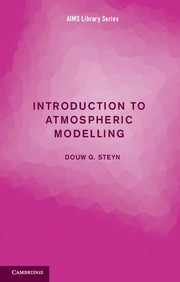
-
Select format
-
- Publisher:
- Cambridge University Press
- Publication date:
- 05 April 2015
- 02 April 2015
- ISBN:
- 9781316182482
- 9781107499799
- Dimensions:
- Weight & Pages:
- Dimensions:
- (216 x 138 mm)
- Weight & Pages:
- 0.15kg, 118 Pages
You may already have access via personal or institutional login
Book description
Introduction to Atmospheric Modelling explores the power of mathematics to help us understand complex atmospheric phenomena through mathematical modelling. The author has thoughtfully chosen a path into and through the subject that gives the reader a glimpse of the dynamics underlying phenomena ranging from a sea breeze through mid-latitude cyclonic disturbances to Rossby waves, mainly through the lens of scaling analysis. Written for students with backgrounds in mathematics, physics and engineering, this book will be a valuable resource as they begin studying atmospheric science.
Contents
Metrics
Altmetric attention score
Full text views
Full text views help Loading metrics...
Loading metrics...
* Views captured on Cambridge Core between #date#. This data will be updated every 24 hours.
Usage data cannot currently be displayed.
Accessibility standard: Unknown
Why this information is here
This section outlines the accessibility features of this content - including support for screen readers, full keyboard navigation and high-contrast display options. This may not be relevant for you.
Accessibility Information
Accessibility compliance for the PDF of this book is currently unknown and may be updated in the future.


